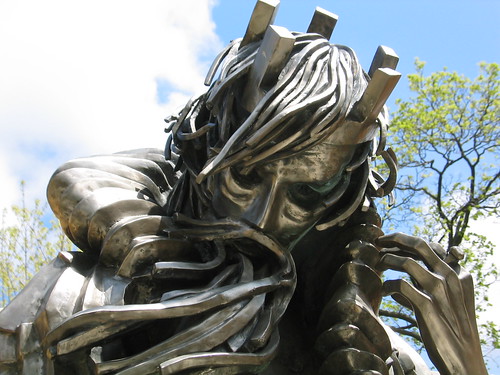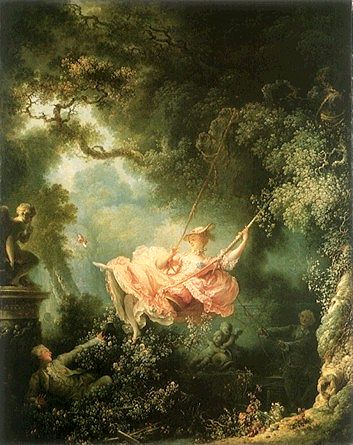THE BOOK
Invisible Man, Ralph Ellison (Vintage)
ISBN: 0-679-73276-4 or 978-0679732761
$13.95
BEFORE YOU READ INVISIBLE MAN READ THIS…
1. Ralph Ellison's Invisible Man won the 1953 National Book Award for fiction. Here's his acceptance speech.
If I were asked in all seriousness just what I considered to be the chief significance of Invisible Man as a fiction, I would reply: Its experimental attitude and its attempt to return to the mood of personal moral responsibility for democracy which typified the best of our nineteenth-century fiction.
When I examined the rather rigid concepts of reality which informed a number of the works which impressed me and to which I owed a great deal, I was forced to conclude that for me and for so many hundreds of thousands of Americans, reality was simply far more mysterious and uncertain, and at the same time more exciting, and still, despite its raw violence and capriciousness, more promising.
To see
~~~~~~~
Invisible Man is at its heart an attempt to use imaginative language to grapple with some of the core questions about living in modern
~~~~~~~
2. References to culture and history permeate Invisible Man, so it’s useful to know some
things before reading. Look up the following and record notes in your journal:
· Louis Armstong's "Black and Blue" appears in the Prologue. (Jazz, improvisation, syncopation are important concepts in the Prologue too.)
· W.E.B. DuBois’s concept of “Double Consciousness” from Souls of Black Folk seems to inform a great deal of the novel and will inform our discussion of identity during the first term.
· Booker T. Washington seems to be the model for the Founder and the philosophy of the school that the narrator attends.
· Although Ellison denies using him as a model, Marcus Garvey is quite similar in some ways to Ras.
· A novel that seems to have influenced one of the motifs and some of the ideas in Invisible Man is Fyodor Dostoyevski’s Notes from Underground.
· Ellison uses a quotation from T. S. Eliot’s The Family Reunion and another from Herman Melville’s Benito Cereno as epigraphs.
· There are other historical and cultural references throughout the book. Some are direct. Most are indirect. Write down questions!
AS YOU READ DO THIS…
· In your journal make note of motifs (include page numbers and a brief note):
o Vision (invisibility, blindness, misunderstanding, sight, visibility,
understanding)
o Light and Dark
o Colors (white, black, red)
o Underground
o Other motifs that you discover (dreams, sex, violence, food, speech and speeches, music, family and blood)
· Also make note of passages (include page numbers and a brief note) that deal with the theme of the self, identity, and the self’s relationship with groups; that demonstrate Ellison’s particular use of language (imaginative, symbolic, experimental, musical, rhythmic, vernacular words choices and sentence structures); that show connections within Invisible Man, between Invisible Man and other things you’ve read (including the cultural and historical references you researched before starting to read), and between your own experiences, thoughts, and feelings and Invisible Man.
These notes will be the foundation for the first unit of the year. We will use the notes to help us write essays.
AFTER
· Write two informal open responses. Respond to specific passages from the novel. (Use quotations in each response.) Show that you can link the novel’s particulars to the novel’s concepts. (That is the essence of AP writing.) Responses should be 300+ words each (about a page 12-point font, double-spaced). In your two responses address some of the issues listed below:
o The theme of identity (individual identity, identity and groups, belonging and alienation);
o Motifs (invisibility and blindness, light and dark (white, black, red), speaking and speeches, music, family and blood, sexuality, violence)
o Ellison’s use of language (“the richness of our speech, the idiomatic expression, and the rhetorical flourishes from past periods which are still alive among us”)
o Ellison’s allegorical (tragic-comic-satiric-surreal-symbolic) style (He said, “leav[e] sociology and case histories to the scientists, [fiction should] arrive at the truth about the human condition, here and now, with all the bright magic of the fairy tale.”
o connections between different parts of the novel; between the novel and other literature you have read (or films you have seen); between the novel and its literary, cultural, and historical context; between the novel and your own experiences, thoughts, and feelings.
· Write an informal personal response to the novel. This response should be 300+ words.
o Have you felt invisible? Invisibility can come from being unnoticed,
disappearing in a crowd, being unheard. Invisibility can also come from being misperceived. In other words people see your body or hear your voice but they don't see or hear you. They project something onto you. Instead of you they might see a stereotype. They might see what they expect to see, want to see, or hope to see. They might see their own fears, their own biases, their own prejudices, etc. Have you experienced this? Have you observed this? (Think about peers, parents, bosses, coaches, customers. Maybe think about gender, social class, race, ethnicity, religion, sexual orientation. What do we actually see? What do we only think we see? What remains invisible?)
o Or respond to a motif, or the novel’s language, or another theme. The important thing is that this response allows you to reflect personally on an issue that arises in the novel.








No comments:
Post a Comment